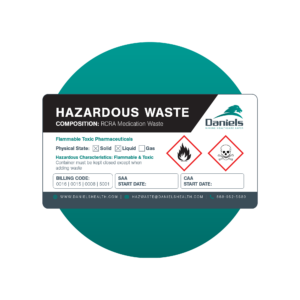How to Ensure Safe Chemical Waste Disposal in Laboratories

Proper chemical waste management in laboratories is fundamental for protecting human health, ensuring environmental safety, and maintaining regulatory compliance. According to the Environmental Protection Agency (EPA), improper chemical waste disposal can result in serious environmental contamination, substantial fines, and potential criminal penalties.
For research facilities, universities, and commercial laboratories, implementing robust chemical waste disposal protocols is not just a legal requirement, but a critical safety imperative for environmental and public health.
TOPICS WE WILL COVER
- Understanding Chemical Waste Types
- Proper Chemical Waste Container Selection
- How to Properly Dispose of Chemicals in a Lab
- Working with Laboratory Waste Disposal Companies
- Regulatory Requirements for Chemical Waste Disposal
- Sustainable Approaches to Chemical Waste Management
- Partner With Daniels Health for Chemical Waste Disposal Services
- Contact Us Today
Understanding Chemical Waste Types
Chemical waste encompasses a broad spectrum of materials commonly found in laboratory settings. The EPA defines hazardous waste through four characteristic properties: ignitability, corrosivity, reactivity, and toxicity. Laboratory chemical waste materials typically fall into several categories of hazardous waste:
- F-Listed Waste: Common solvents and cleaning solutions from non-specific sources
- K-Listed Waste: Chemical production and manufacturing process waste
- P-Listed Waste: Acutely toxic commercial chemical products
- U-Listed Waste: Less toxic commercial chemical products and their residues
These materials present significant risks, including fire hazards, toxic exposure, environmental contamination, and potential chemical reactions.
According to the National Institute of Health (NIH), even small quantities of improperly disposed chemicals can contaminate large volumes of water and soil, making proper disposal crucial for environmental protection.
Proper Chemical Waste Container Selection
The selection of appropriate containers is critical for safe chemical waste storage.
Container Requirements
The Occupational Safety and Health Administration (OSHA) mandates that containers must be:
- Chemically compatible with stored waste
- Free from damage or deterioration
- Equipped with secure, leak-proof closures
- Located in well-ventilated areas
- Properly sized for the volume of waste
- Protected from environmental factors
Hazardous Waste Label Protocols
The EPA’s Hazardous Waste Program requires specific labeling elements for all hazardous waste containers. Each container must clearly display:
- The words “Hazardous Waste” in clear, visible text
- Complete chemical names (no abbreviations or formulas)
- A list of chemical constituents present in the waste
- Generation start date
- Department and room number
- Principal investigator’s contact information
- Applicable hazard warnings
How to Properly Dispose of Chemicals in a Lab
Segregation Requirements
The National Research Council emphasizes that chemical waste must be accumulated at or near the point of generation, under laboratory personnel control. Their guidelines specify:
- Separation of incompatible chemicals using physical barriers
- Maintenance of appropriate storage distances
- Use of secondary containment systems
- Regular inspection of storage areas
- Documentation of waste accumulation
Storage Management
The EPA’s Subpart K regulations, specifically designed for academic laboratories, require:
- Maximum storage time of six months within academic facility
- Regular laboratory clean-outs
- Weekly documented inspections
- Proper ventilation systems
- Emergency response procedures
- Spill control equipment availability
Working with Laboratory Waste Disposal Companies
Professional laboratory waste disposal services must demonstrate:
- Current EPA permits and licenses
- Comprehensive insurance coverage
- Trained hazardous materials handlers
- Proper transportation equipment
- Detailed documentation procedures
- Emergency response capabilities
Regulatory Requirements for Chemical Waste Disposal
The Resource Conservation and Recovery Act (RCRA) establishes hazardous waste regulations. Key compliance requirements include:
- Prohibition of disposal in regular trash or sewer systems
- Mandatory waste generation documentation
- Regular removal of waste from laboratories
- Proper training for all hazardous waste generators
- Annual reporting requirements
- Contingency planning
Sustainable Approaches to Chemical Waste Management
The National Research Council recommends implementing sustainable practices through:
Waste Minimization
- Microscale laboratory techniques
- Computer simulations when possible
- Purchase planning to minimize excess
- Chemical exchange programs
- Process optimization
Green Chemistry Integration
- Use of environmentally friendly solvents
- Implementation of waste reduction protocols
- Development of less hazardous procedures
- Recovery and recycling programs
- Regular process evaluation
Partner With Daniels Health for Chemical Waste Disposal Services
With almost four decades of experience, Daniels Health specializes in chemical and hazardous waste management for laboratories, research facilities, and educational institutions. Our chemical waste disposal services are designed to ensure complete regulatory compliance while promoting environmental sustainability.
Comprehensive Chemical Waste Solutions
Our team specializes in the expert handling of all laboratory chemical waste streams, providing specialized containment systems for hazardous materials. We ensure the safe disposal of organic solvents, acids, bases, and heavy metals, alongside the management of expired chemicals and unwanted laboratory reagents. Our services also encompass the disposal of contaminated materials and the handling of mixed chemical and radioactive waste, guaranteeing adherence to industry standards.
Industry-Leading Safety & Compliance
We prioritize safety and compliance by following EPA, DOT, and RCRA regulations for transportation and disposal. Our process includes complete chemical waste characterization, detailed documentation through waste manifests, and chain of custody tracking from collection to disposal. We also offer emergency response capabilities for chemical spills and conduct regular compliance audits to ensure ongoing adherence to safety standards.
Sustainable Chemical Waste Management
Committed to sustainability, we implement waste minimization strategies and facilitate chemical recycling and recovery programs wherever possible. Our approach focuses on reducing environmental impact through effective treatment methods, detailed tracking of chemical waste volumes, and support for achieving zero waste-to-landfill goals, complemented by regular sustainability reporting.
Expert Support Services
We provide on-site chemical waste assessments and develop tailored chemical hygiene plans. Our staff training programs cover proper chemical waste handling, storage, and segregation, along with regular safety consultations and 24/7 technical support. Our goal is to help laboratories establish comprehensive waste management strategies that ensure regulatory compliance, cost-effective disposal, environmental protection, workplace safety, and risk mitigation through sustainable practices.
Contact us Today
Thanks to our specialized chemical waste services, laboratories can focus on their core research and testing activities while having peace of mind that their chemical waste is being handled safely, legally, and sustainably. Our proven expertise in chemical waste management makes us the trusted partner for laboratories nationwide. Contact Daniels Health to develop a comprehensive waste management solution that addresses your specific needs while ensuring compliance with all applicable regulations.
Let's Talk!
Your time is valuable, and we don’t want to play hard to get. You can either phone us directly on the details listed on our contact page, or feel free to fill out this short form and one of our team members will get back to you as quickly as possible.
